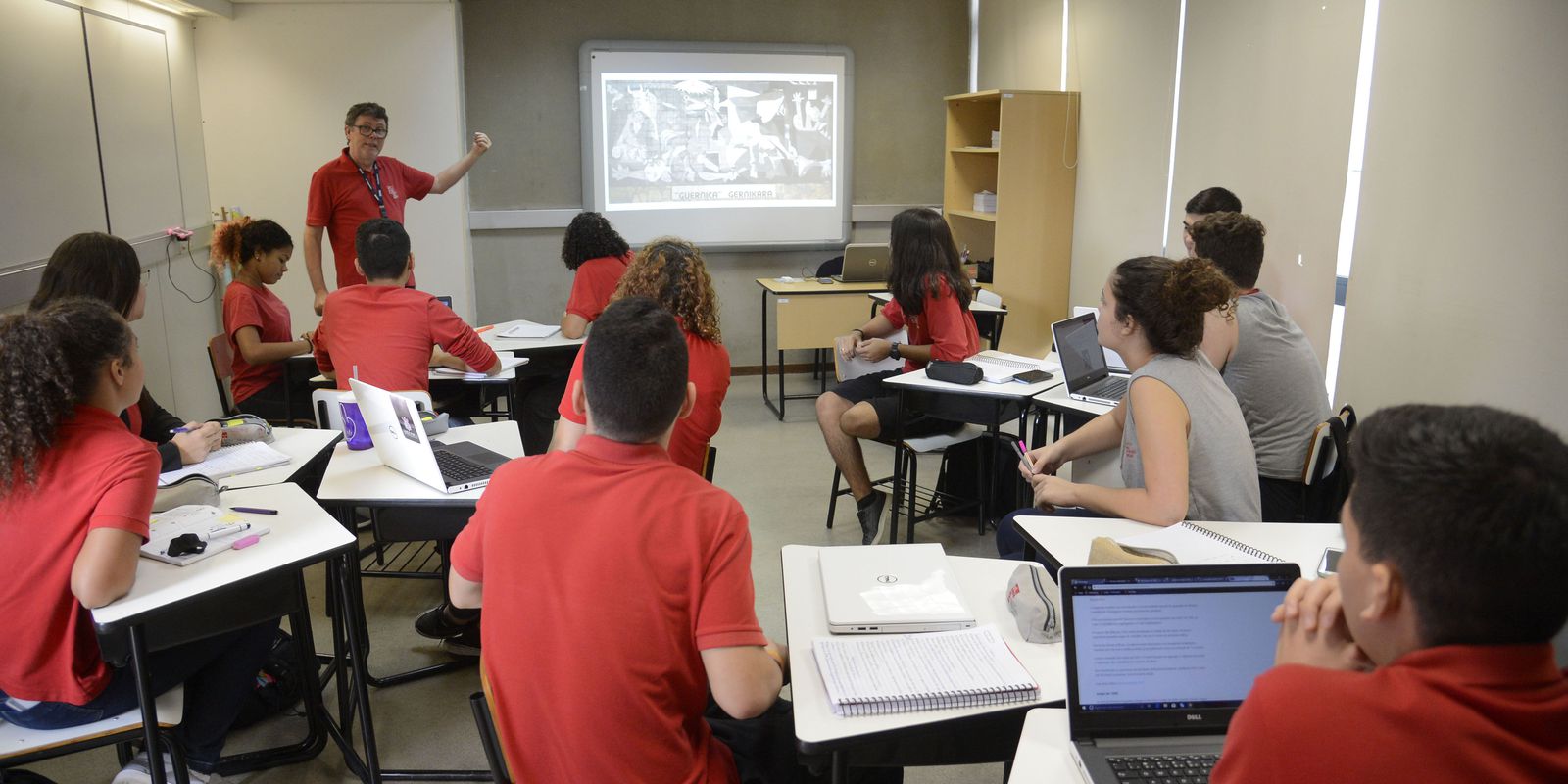A survey by the Força Meninas educational platform, launched today (14), highlights that six out of ten girls (62%) from public schools do not know anyone who works professionally in STEM areas (acronym in English to indicate science, technology, engineering and mathematics). Among male students, the percentage is lower, 42%. The results are a guide to understand the impact of the lack of female representation.
When boys and girls are asked if they know a woman who works with STEAM, 57.1% say no. Among those who have someone with this profile in their midst, the most common are female mathematicians (18.7%). Next, women physicists (6%), chemists (5.9%) and engineers (4%) are mentioned.
The survey consolidated indicators based on the application of a questionnaire to 1,232 boys and girls aged 10 to 17 years old, with a sample of 37,400 elementary school students from public schools in four regions of the country. Interviews were also carried out with 230 girls between the ages of 10 and 18, visits to 17 schools – ten public and seven private – and in-depth interviews with five girls with high school performance from the five regions of Brazil, in addition to 24 conversation circles . The investigation lasted one year and was carried out in partnership with the creative research consultancies 65|10 and Studio Ideias.
The teams responsible for the study found that 44% of girls consider math the most difficult subject, against only 28% of boys. Despite this, the same discipline appears as the most important for the interviewed girls. Next come financial education, self-defense/first aid, Portuguese and science.
In the responses, both subjects that make up the school curriculum and others that are not included in it or that they would like to be part of were considered. At the public school in Belém, the students said they wanted to take sex education classes, as a way to prevent teenage pregnancy and also to protect themselves against sexual violence, in its different forms.
As the founder of Força Meninas and creator of the study, Déborah De Mari, explains, what was observed during the survey was that the students with more aptitude for the exact subjects have, in general, a good school report and like from school. According to her, there are girls who value education more, seeing it as a way to develop their potential, and others who, “due to a series of issues”, including the fact that they did not assimilate content during the pandemic and family discouragement , they are no longer interested in studying.
“The first subjects affected by this lack of interest were those with which they have less affinity, in which they see less female representation, less future. The first of them is mathematics itself, which has a lot of this emblem of difficulty and of being a territory that is not very feminine”, says Déborah, adding that, for many students, there is a “disconnection” between what they learn and what they face in reality.
The incentive, in many cases, can be the missing component for them to follow a path and reach higher education. Déborah says that, in the story of Letícia, a young woman from the interior of Ceará, who aroused her curiosity for astronomy was her grandmother. It was the beginning of everything.
“Today she is an 18-year-old girl, I believe, she is in the United States, she has a 100% scholarship. She has already won several awards, she is the first woman in her family to graduate, from a rural family. A family that had limitations due to location, due to financial vulnerability, always encouraged her to develop. Then, when she entered a federal institute, she was able to study and had educators who encouraged her to develop in terms of education and scientific initiation”, says Déborah. “It messes with the structure of the entire family.”
With the students’ reports, the team was able to capture how the students relate to the STEM bases, since it is known that this is a sphere where the participation of women is low. According to a report by the United Nations Educational, Scientific and Cultural Organization (Unesco), carried out in partnership with the British Council, it is estimated that in Latin America and the Caribbean only one woman for every four men gets a job in STEM area.
Another factor that weighs against girls is the gender stereotype, in the sense that images associated with women still influence students’ choices. According to Déborah, many students choose to follow paths that, in theory, should give them more popularity and less rejection from their interpersonal circle, something important, especially during adolescence.
“I think there’s a fear, somehow, of confirming other people’s expectations that this won’t go anywhere. It’s as if they’re expecting something for themselves that’s impossible to achieve or isn’t for them. One fear of insisting on it and then confirming disbelief. Another thing I feel is the following: even girls who are interested, when younger, around 13 years old, become discouraged over time, to continue fitting into the prevailing standards. they think that liking that doesn’t bring any attribute with regard to being well liked, popular among friends, many girls who have talent give up halfway through”, points out Déborah.
Caregiver woman stereotype
Although it is only an assumption and has not been proven in practice, the idea that women are more inclined to be caregivers is another element that influences girls’ perspectives. “When we go to the conversation groups with the girls, what we realize is that, yes, there are some models linked to celebrities”, says Déborah, when asked about which women were the most references.
“In addition, another figure that appeared very strong – three, in fact -, who have a similar role. That of a cousin or aunt who, despite all the difficulties, managed to establish herself in a profession and have independence, live better than in that context in which it is inserted. They bring as an example this figure who managed to transform reality”, highlights the founder of the platform.
“And the figure of the single mother also appeared a lot, especially in public schools, and the grandmother who raises, who is that person linked to the expression ‘She goes hungry, she takes it out of her mouth [para dar alimento aos familiares]’. We heard that a lot, this savior woman, extreme caregiver, who goes over any personal effort to keep the minimum for that family to develop “, she adds.
This characteristic is manifested in the professions mentioned by the students. Among those who study in private schools, what prevails when choosing their professional future is the lifestyle they intend to have or a decision that involves the parents, the family. In first place on the list, therefore, appears the medical career, linked to status social life and a high salary, but also linked to the notion of care.
Among girls from public schools, points that determine the choice of occupation are the experiences of violence they have already experienced, the possibility of occupying a position of power that guarantees greater protection for themselves and their families. Care-related professions also stand out here. As a result, in first, second and third place, the professions of doctor, police/delegate and veterinarian, respectively, appear.
For Déborah, achieving a more egalitarian environment depends on “commitment in all spheres”, with the involvement of parents and educators. “Gender inequality, which is already very serious, will deepen if we don’t act quickly and don’t act in the present”, she concludes.
The report “Curious girls, women of the future. Brazilian girls and insertion in STEM: an abyss in the present and horizon for the future” can be read, in full, here.

















